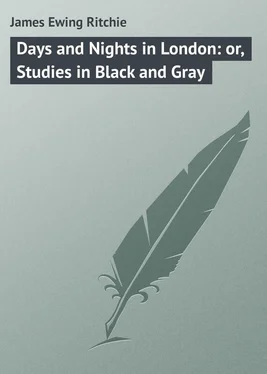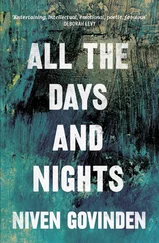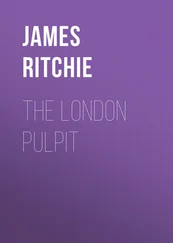James Ritchie - Days and Nights in London - or, Studies in Black and Gray
Здесь есть возможность читать онлайн «James Ritchie - Days and Nights in London - or, Studies in Black and Gray» — ознакомительный отрывок электронной книги совершенно бесплатно, а после прочтения отрывка купить полную версию. В некоторых случаях можно слушать аудио, скачать через торрент в формате fb2 и присутствует краткое содержание. Жанр: foreign_prose, на английском языке. Описание произведения, (предисловие) а так же отзывы посетителей доступны на портале библиотеки ЛибКат.
- Название:Days and Nights in London: or, Studies in Black and Gray
- Автор:
- Жанр:
- Год:неизвестен
- ISBN:нет данных
- Рейтинг книги:3 / 5. Голосов: 1
-
Избранное:Добавить в избранное
- Отзывы:
-
Ваша оценка:
- 60
- 1
- 2
- 3
- 4
- 5
Days and Nights in London: or, Studies in Black and Gray: краткое содержание, описание и аннотация
Предлагаем к чтению аннотацию, описание, краткое содержание или предисловие (зависит от того, что написал сам автор книги «Days and Nights in London: or, Studies in Black and Gray»). Если вы не нашли необходимую информацию о книге — напишите в комментариях, мы постараемся отыскать её.
Days and Nights in London: or, Studies in Black and Gray — читать онлайн ознакомительный отрывок
Ниже представлен текст книги, разбитый по страницам. Система сохранения места последней прочитанной страницы, позволяет с удобством читать онлайн бесплатно книгу «Days and Nights in London: or, Studies in Black and Gray», без необходимости каждый раз заново искать на чём Вы остановились. Поставьте закладку, и сможете в любой момент перейти на страницу, на которой закончили чтение.
Интервал:
Закладка:
Ritchie J. Ewing James Ewing
Days and Nights in London; Or, Studies in Black and Gray
PREFACE
London has vastly altered since the Author, some quarter of a century ago, described some of the scenes which occurred nightly in its midst of which respectable people were ignorant, which corrupted its young men and young women, and which rendered it a scandal and a horror to civilisation itself. The publication of his work, “The Night Side of London” – of which nearly eight thousand copies were sold – did something, by calling the attention of Members of Parliament and philanthropists to the subject, to improve the scenes and to abate the scandal. As a further contribution to the same subject, the present volume is published. Every Englishman must take an interest in London – a city which it has taken nearly two thousand years to build; whose sons, to enrich which, have sailed on every sea and fought or traded on every land; and which apparently, as the original home and centre of English-speaking people, must grow with the growth and strengthen with the strength of the world.
Wrentham House, Hendon,
February , 1880.
I. – THE WORLD OF LONDON
London, for a “village,” as old Cobbett used to call it, is a pretty large one; and, viewed from the lowest stand-point – that of the dull gospel according to Cocker – may well be described as truly wonderful. It eats a great deal of beef, and drinks a great deal of beer. You are staggered as you explore its warehouses. I stood in a granary the other day in which there were some eighty thousand sacks of wheat; and in the Bank of England I held in my hand, for a minute – all too brief – a million of pounds. It is difficult to realise what London is, and what it contains. Figures but little assist the reader.
Perhaps you best realise what the city is as you come up the Thames as far as London Bridge. Perhaps another way is to stand on that same bridge and watch the eager hordes that cross of a morning and return at night, and then, great as that number is, to multiply it a hundredfold. A dozen miles off gardeners tell you that there are plants that suffer from London air and London fog. Indeed it is difficult to say where London begins and where it ends. If you go to Brighton, undoubtedly it is there in all its glory; when yachting far away in the western islands of Scotland and the Hebrides, the first signature I found in the strangers’ book at a favourite hotel was that of Smith, of London. There he was, as large as life, just as we see him any day in Cheapside. One bitter cold winter day I revisited, not exactly my childhood’s happy home, but a neighbouring sea port to which I was once much attached. “Oh,” said I to myself, as I rushed along in the train, “how glad people will be to see me; how bright will be the eyes into which I once loved to look, and how warm the clasp of the hand which once thrilled through all my being!” Alas! a generation had risen who knew not Joseph. I dined sadly and alone at the hotel, and after dinner made my way to the pier to mingle my melancholy with that of the melancholy ocean. The wind was high; the sand in clouds whirled madly along the deserted streets. At sea even nothing was to be seen; but at the far end of the pier, with his back turned to me, gazing over as if he wanted to make out the coast of Holland – some hundred and fifty miles opposite – was a short man, whom I knew at once from his apoplectic back – Brown, of Fleet Street – come there all the way from the congenial steak puddings and whisky toddy of The Cheshire Cheese for a little fresh air! I felt angry with Brown. I was ready almost to throw him over into the raging surf beneath, but I knew that was vain. There were “more to follow.” Nowadays London and London people are everywhere. What is London? It covers, says one, within a fifteen-miles’ radius of Charing Cross, so many hundred square miles. It numbers more than four million inhabitants. It comprises a hundred thousand foreigners from every quarter of the globe. It contains more Roman Catholics than there are in all Rome; more Jews than there are in all Palestine; and, I fear, more rogues than there are even in America. On a Sunday you will hear Welsh in one church, Dutch in another, the ancient dialect of St. Chrysostom in another; and on a Saturday you may plunge into low dancing-houses at the East-End which put to shame anything of the kind in Hamburg or Antwerp or Rotterdam. In many of the smoking-rooms bordering on Mark Lane and Cheapside you hear nothing but German. I know streets and squares inhabited by Dutch and German Jews, or dark-eyed Italians, or excitable Frenchmen, where is as little understood as Sanscrit itself. At any moment I like I can rush away from all European civilisation, and sit in a little room and smoke opium with the heathen Chinee – whose smile all the while is “childlike and bland” – as if I were thousands of miles away. On the other side of St. Paul’s I have supped with hundreds of thieves at a time, who carry on their work as if there was no such institution as that of the police; I have listened to the story of the crowded lodgers, and I can believe anything you like to tell me of the wealth, of the poverty, of the virtue, of the vice of London. People say the metropolis has seven thousand miles of streets. I have no doubt it has. People say it has on Sunday sixty miles of shops open, and they may be right; at least I have neither the time nor the inclination to test these figures. It also rejoices, I hear, in as many public-houses as, if set in a line, would reach from Charing Cross to Portsmouth. The people of London read or write in the course of a year as many as two hundred and forty millions of letters. All these letters are written, all these public-houses supported, all these streets lined with houses inhabited by men who more or less are connected with the city. It is there they live, if they sleep fifty miles away, and it is a hard life some of them have assuredly. A little while ago a poor woman was charged with pawning shirts entrusted to her to make by an East-End merchant clothier. The woman pleaded that her children were so hungry that she was tempted to pawn some of the work in the hope of being able to redeem it by the time the whole was completed. The work was machine-sewing. She hired the machine at half-a-crown a week, and was paid by the prosecutor a shilling a dozen for his shirts.
The tongue that Shakespeare spake
“Nonsense,” said the magistrate; “that is only a penny each.”
“And that is all it is, sir,” said the poor woman.
“And you have to work a long day to make twelve. And is it really a fact,” said the magistrate, turning to the merchant clothier, “that this kind of work has fallen into such a deplorable condition that you can get it done at so poor a rate?”
“Your worship,” was the reply, “if I wanted a hundred hands at the price I could get ’em by holding up my finger.”
Nowhere does life run to such extremes; – nowhere is there such pauperism as in London; nowhere is there such wealth; nowhere does man lift a sublimer face to the stars; nowhere does he fall so low. In short, London may be described as “one of those things which no fellah can understand.”
In beauty London now may almost vie with fair bewitching Paris. In all other respects it leaves it far behind. It is the brain of England, the seat of English rule, whence issue laws which are obeyed in four quarters of the globe, and the fountain of thought which agitates and rules the world. London is the head-quarters of commerce. Tyre and Sidon and Carthage, the republics of Italy, the great cities of the Hanseatic Confederation, Flemish Ghent or Bruges, or Antwerp or busy Amsterdam, never in their canals, and harbours, and rivers, sheltered such burdened argosies; in their streets never saw such wealthy merchants; in their warehouses never garnered up such stores of corn and wine and oil.
Читать дальшеИнтервал:
Закладка:
Похожие книги на «Days and Nights in London: or, Studies in Black and Gray»
Представляем Вашему вниманию похожие книги на «Days and Nights in London: or, Studies in Black and Gray» списком для выбора. Мы отобрали схожую по названию и смыслу литературу в надежде предоставить читателям больше вариантов отыскать новые, интересные, ещё непрочитанные произведения.
Обсуждение, отзывы о книге «Days and Nights in London: or, Studies in Black and Gray» и просто собственные мнения читателей. Оставьте ваши комментарии, напишите, что Вы думаете о произведении, его смысле или главных героях. Укажите что конкретно понравилось, а что нет, и почему Вы так считаете.












